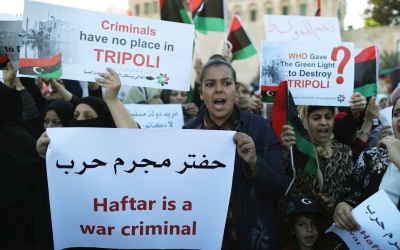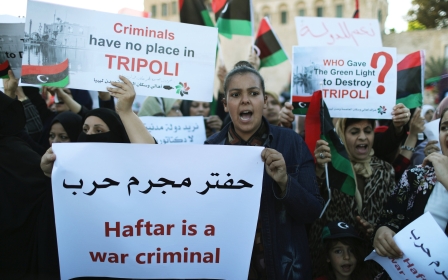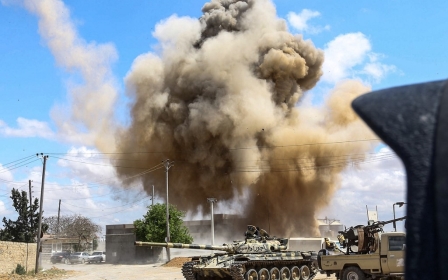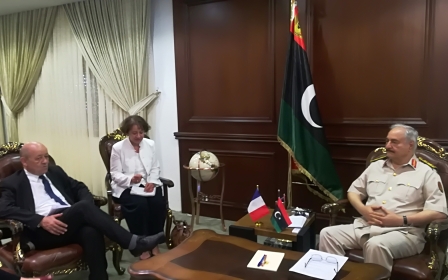Deadly shelling in Tripoli intensifies as battle for Libyan capital heats up
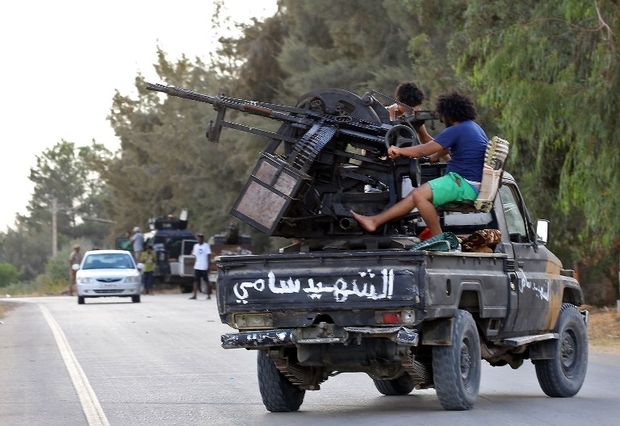
At least four people have been killed as at least seven powerful explosions rocked Tripoli's city centre, while residents reported hearing shelling in several parts of the Libyan capital.
The flare-up came as eastern forces led by commander Khalifa Haftar continued their offensive to seize the city.
According to residents in central districts, the shelling has intensified compared with other nights, the Reuters and AFP news agencies reported.
An emergency official in the city told Reuters that two people were killed.
Nearly two weeks into its assault, the eastern-based Libyan National Army (LNA) is stuck in the city's southern outskirts, battling armed groups loyal to the internationally recognised Tripoli government.
New MEE newsletter: Jerusalem Dispatch
Sign up to get the latest insights and analysis on Israel-Palestine, alongside Turkey Unpacked and other MEE newsletters
Forces allied to Tripoli have accused the LNA of firing rockets into residential areas, but the LNA said in a statement it was not behind the late night shelling.
UK calls on UN to demand ceasefire
As rockets fell on the city, the UK called on the UN Security Council to demand an immediate ceasefire.
Britain's proposals described the LNA as a force that "threatens the stability of Libya and prospects for a United Nations-facilitated political dialogue and a comprehensive political solution to the crisis".
International powers are worried but unable to present a united front over the latest flare-up gripping Libya since dictator Muammar Gaddafi was toppled in 2011.
Since fighting began in early April, dozens of people have been killed, and more than 18,000 have been displaced.
The fighting has threatened to disrupt oil flows, fomented migration across the Mediterranean Sea to Europe, and allowed militant groups to exploit the chaos.
Qatar said an existing UN arms embargo on Libya should be strictly enforced, to prevent Haftar from receiving arms.
'State-of-the-art weapons'
Benghazi-based Haftar enjoys the backing of Egypt, the United Arab Emirates and Saudi Arabia, who view him as an anchor to restore stability.
Those three nations cut ties with Qatar in 2017, accusing it of supporting militants and Iran, an accusation Doha denies.
Qatar's Foreign Minister Sheikh Mohammed bin Abdulrahman al-Thani told La Repubblica, an Italian newspaper, that a postponed UN peace forum should be rescheduled and Haftar's army made to withdraw in the meantime.
He urged the arms embargo to be implemented "to prevent those countries that have been providing ammunitions and state-of-the-art weapons from continuing to do so".
Past UN reports say the UAE and Egypt have both supplied Haftar with arms and aircraft, giving him air superiority among Libya's multiple factions.
East Libyan authorities told Reuters that Qatar and Turkey back rival factions in western Libya.
'Would-be dicatator'
The Gulf diplomatic divisions echo those in Europe, where former colonial ruler Italy and France have sparred over Libya.
Paris has given Haftar support in the past, viewing him as the best bet to end the chaos since a NATO-backed rebellion to end Gaddafi's four-decade rule.
Italy, with considerable oil interests in the OPEC member, supports the Tripoli government of Prime Minister Fayez al-Serraj and was furious with French reluctance to back a recent European Union resolution urging Haftar to halt his advance.
Though Haftar presents himself as a champion against what he calls terrorism, opponents cast him as a would-be dictator in the mould of Gaddafi.
Middle East Eye delivers independent and unrivalled coverage and analysis of the Middle East, North Africa and beyond. To learn more about republishing this content and the associated fees, please fill out this form. More about MEE can be found here.


